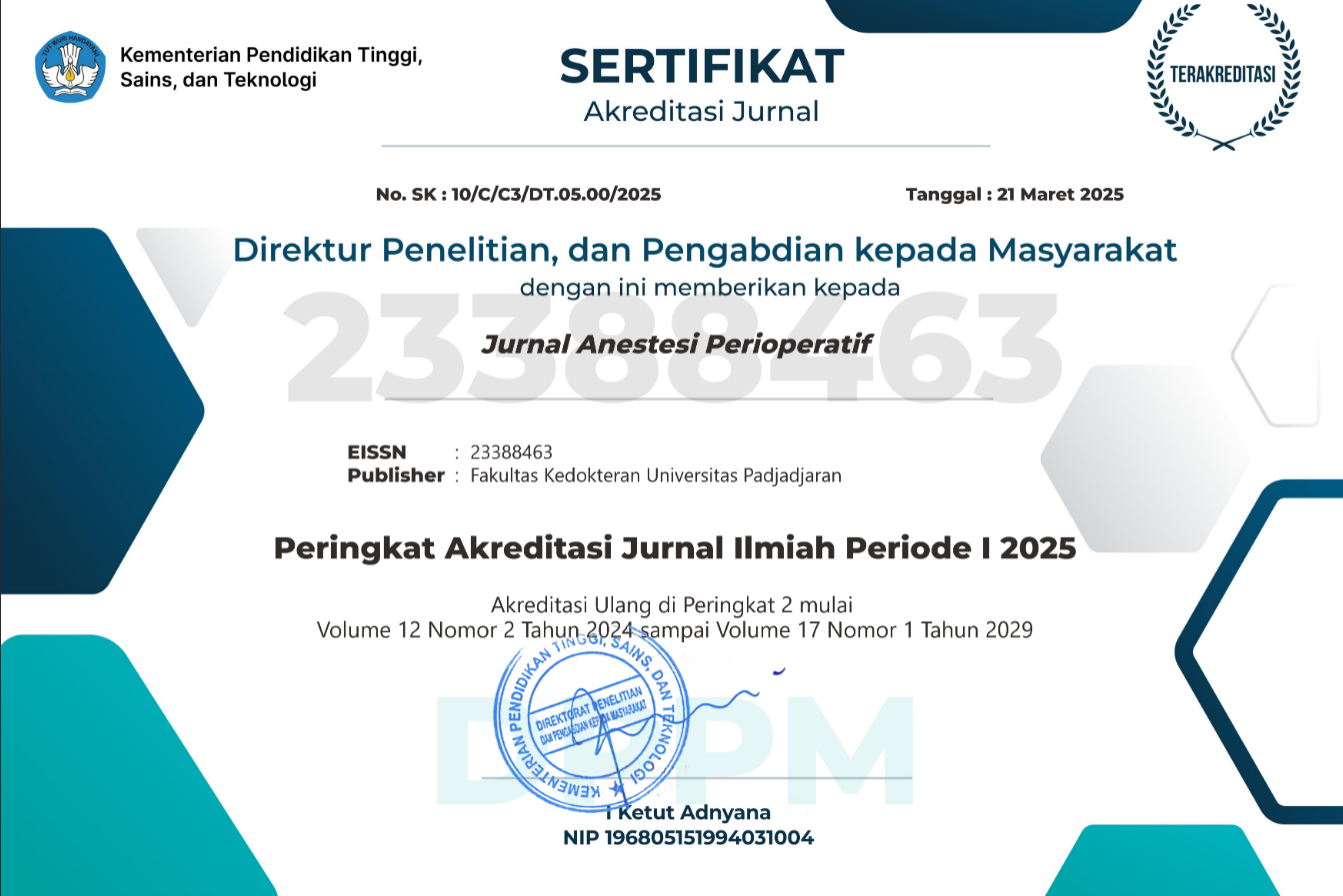Perbandingan Excessive Daytime Sleepiness dengan Normal Daytime Sleepiness terhadap Fungsi Kognitif serta Waktu Reaksi Peserta PPDS Anestesiologi dan Terapi Intensif
Abstract
Excessive daytime sleepiness (EDS) adalah ketidakmampuan untuk tetap terjaga pada siang hari yang menghasilkan rasa kantuk berlebih dan tertidur pada waktu yang tidak tepat. Prevalensi EDS yang tinggi ditemukan pada tenaga medis seperti peserta Program Pendidikan Dokter Spesialis (PPDS) Anestesiologi dan Terapi Intensif. Kondisi EDS dapat memengaruhi fungsi kognitif dan waktu reaksi. Tujuan penelitian ini adalah membandingkan EDS dengan normal daytime sleepiness (NDS) terhadap fungsi kognitif serta waktu reaksi peserta PPDS Anestesiologi. Penelitian ini merupakan penelitian analitik komparatif numerik dengan rancangan potong lintang yang dilakukan pada peserta PPDS Anestesiologi Fakultas Kedokteran Universitas Padjadjaran di bulan November 2020. Seluruh PPDS Anestesiologi mengisi kuisioner Epworth Sleepiness Scale (ESS) agar terbagi menjadi dua kelompok, kelompok EDS (n=23) dan kelompok NDS (n=23). Fungsi kognitif diukur menggunakan tes Montreal Cognitive Assessment versi Bahasa Indonesia dan waktu reaksi menggunakan perangkat lunak Personal Computer-Psychomotor Vigilance Task. Hasil penelitian menunjukkan fungsi kognitif lebih rendah pada kelompok EDS (26,74±1,096) dibanding dengan kelompok NDS (28,65±1,191) dan waktu reaksi lebih lambat pada kelompok EDS (337,38±62,021) dibanding dengan kelompok NDS (298,81±34,225). Simpulan penelitian adalah peserta PPDS Anestesiologi kelompok EDS memiliki fungsi kognitif lebih rendah dan waktu reaksi lebih lambat dibanding dengan peserta PPDS Anestesiologi kelompok NDS.
Comparison between Excessive Daytime Sleepiness and Normal Daytime Sleepiness on Cognitive Function and Reaction Time of Anesthesiology and Intensive Care Residents
Excessive daytime sleepiness (EDS) is the inability to stay alert during the day due to sleepiness during daytime, often associated with the tendency of falling asleep during inappropriate times. High prevalence of EDS was found among medical workers, such as anesthesiology residents. The condition is associated with increased secretion of cathecholamines, cortisol, and inflammatory mediators that may affect the prefrontal cortex, area of the brain that acts as a center for cognitive function and reaction time. The study aimed to compare EDS with normal daytime sleepiness (NDS) on cognitive function and reaction time of anesthesiology residents. The research was a numerical comparative analytic study with a cross-sectional design performed on anesthesiology residents of Faculty of Medicine Universitas Padjadjaran in November 2020. All residents in the department were instructed to complete the Epworth Sleepiness Scale (ESS) questionnaire. After completion, the respondents were randomized using simple random sampling into two groups: the EDS group (n=23) and NDS group (n=23). Each group was assessed for cognitive function using the Indonesian version of the Montreal Cognitive Assessment and reaction time using the Personal Computer-Psychomotor Vigilance Task software. Lower cognitive function scores were found in EDS group (26.74±1.096) compared to NDS group (28.65±1.191); slower reaction time were found in EDS group (337.38±62.021) compared to NDS group (298,81±34.225). Both variables had shown significant differences between both groups (p<0.05). The study had concluded that anesthesiology residents with EDS have lower cognitive scores and slower reaction time compared to anesthesiology residents with NDS.
Keywords
Full Text:
PDFReferences
Siddalingaiah S, Mastin D, Moore B, Bryson W, Chandrakala D, Singh A. Prevalence and determinants of excessive daytime sleepiness among resident doctors at a tertiary care institution in India. Int J Community Med Public Heal. 2018 23;5:1407.
Hanlon JG, Hayter MA, Bould MD, Joo HS, Naik VN. Perceived sleepiness in Canadian anesthesia residents: a national survey. Can J Anaesth. 2009;56(1):27–34.
Gregory P, Edsell M. Fatigue and the Anaesthetist. Contin Educ Anaesth Crit Care Pain. 2013 19;14(1):18–22.
Hurtado-Alvarado G, Pavon L, Castillo-García S, Hernández M, Dominguez-Salazar E, Velázquez-Moctezuma J, dkk. Sleep loss as a factor to induce cellular and molecular inflammatory variations. Clin Dev Immunol. 2013 Dec 3;2013:801341.
Arnsten AFT. Stress signalling pathways that impair prefrontal cortex structure and function. Nat Rev Neurosci. 2009; 10(6):410–22.
Sinha A, Singh A, Tewari A. The fatigued anesthesiologist: a threat to patient safety?. J Anaesthesiol Clin Pharmacol. 2013;29:151–9.
Stiegler MP, Neelankavil JP, Canales C, Dhillon A. Cognitive errors detected in anaesthesiology: a literature review and pilot study. Br J Anaesth. 2011;108(2):229–35.
Jaussent I, Bouyer J, Ancelin M-L, Berr C, Foubert-Samier A, Ritchie K, dkk. Excessive sleepiness is predictive of cognitive decline in the elderly. Sleep. 2012;35:1201–7.
Kaliyaperumal D, Elango Y, Alagesan M, Santhanakrishanan I. Effects of sleep deprivation on the cognitive performance of nurses working in shift. J Clin Diagn Res. 2017/08/01. 2017;11(8):CC01–3.
Li Y, Vgontzas A, Kritikou I, Fernandez-Mendoza J, Basta M, Pejovic S, dkk. Psychomotor vigilance test and its association with daytime sleepiness and inflammation in sleep apnea: clinical implications. J Clin Sleep Med. 2017 Sep 15;13(9):1049–56.
Saadat H, Bissonnette B, Tumin D, Raman V, Rice J, Barry N,dkk. Effects of partial sleep deprivation on reaction time in anesthesiologists. Paediatr Anaesth. 2017;27(4):358–62.
Wen X, Wang N, Liu J, Yan Z, Xin Z. Detection of cognitive impairment in patients with obstructive sleep apnea hypopnea syndrome using mismatch negativity. Neural Regen Res. 2012;7(20):1591–8.
Jester DJ, Lee S, Molinari V, Volicer L. Cognitive deficits in Parkinson’s disease with excessive daytime sleepiness: a systematic review. Aging Ment Heal. 2020;24(11):1769–80.
Thomann J, Baumann C, Landolt H-P, Werth E. Psychomotor vigilance task demonstrates impaired vigilance in disorders with excessive daytime sleepiness. J Clin Sleep Med. 2014 Sep 15;10(9):1019–24.
Basner M, Dinges DF. Maximizing sensitivity of the psychomotor vigilance test (PVT) to sleep loss. Sleep. 2011;34(5):581–91.
DOI: https://doi.org/10.15851/jap.v9n2.2391
Article Metrics
Abstract view : 5337 timesPDF - 852 times
This Journal indexed by

JAP is licensed under a Creative Commons Attribution-NonCommercial 4.0 International License
View My Stats



